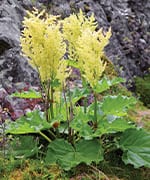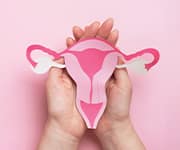Life Extension Magazine®
Hot flashes. Mood swings. Trouble sleeping. Sexual/bladder problems.
Menopausal symptoms make women miserable.
For those who prefer to avoid hormones, there’s a practical alternative.
Used widely in Germany for decades, a Siberian rhubarb root extract has been shown to significantly reduce all common menopausal symptoms—without side effects.
In one study, it led to an 83% reduction in the severity of menopause symptoms.1
Common Menopause Symptoms
Menopause officially begins when a woman has gone 12 months without menstruating.
Symptoms generally start when a woman is in her 40s in response to reduced production of estrogen and progesterone.2
The 11 commonly recognized symptoms of menopause include:3
- Hot flashes and excessive sweating,
- Sleep problems,
- Physical and mental exhaustion,
- Depressive mood,
- Heart discomfort,
- Irritability,
- Anxiety,
- Joint and muscular discomfort,
- Sexual problems,
- Bladder problems, and
- Vaginal dryness.
A plant extract has been shown to alleviate all these symptoms…without hormones.
The Rhubarb Remedy
For decades, Germans have used an extract from the root of the Siberian rhubarb plant to treat menopausal symptoms.4,5
Most of these symptoms are caused by decreased estrogen production. Estrogen binds to receptor sites on cell membranes to activate cellular processes.
In preclinical studies, the extract from the roots of Siberian rhubarb has shown greater affinity for the beneficial estrogen receptor-beta (ER-beta) than for potentially detrimental estrogen receptor-alpha (ER-alpha).6,7
The ability of Siberian rhubarb extract to selectively activate ER-beta but not ER-alpha is a key reason for its safety.8
In multiple studies, this extract has significantly improved all 11 symptoms.
In one study, 109 perimenopausal women received 4 mg of Siberian rhubarb extract or a placebo daily for three months. Within one month, those receiving Siberian rhubarb reported significant reductions in the number and severity of hot flashes. After three months, women taking the extract had a 54% reduction in the severity of menopause symptoms.9
Other studies have reported even more robust benefits.
A trial of 112 menopausal women10 found that taking 4 mg of Siberian rhubarb for three months decreased the median number of hot flashes from 12 episodes to 2 episodes per day. That’s a six-fold reduction! Women in the placebo group had a median 8% increase in the number of daily hot flashes.
In a year-long trial of perimenopausal women, those taking Siberian rhubarb extract daily had a remarkable 83% reduction in the overall severity of symptoms.1
What you need to know
Manage Menopause with Siberian Rhubarb
- Menopause is accompanied by 11 common symptoms, including hot flashes, sleep problems, mood swings, bladder, and sexual problems, and more.
- Siberian rhubarb extract has been widely used in Germany for decades to manage menopause symptoms safely and effectively.
- Multiple human studies show that Siberian rhubarb extract significantly relieves all 11 symptoms and reduces overall symptom severity by up to 83%.
Wide-Ranging Relief
The benefits of Siberian rhubarb extend to all common symptoms.
Sleep difficulties affect most menopausal women, particularly during perimenopause.11,12 Perimenopausal women taking a daily dose of Siberian rhubarb extract reduced the severity of sleep problems by up to 60%.10
Mood changes, irritability, depression, and anxiety are also common during perimenopause.13,14 One study recruited perimenopausal women who reported feelings of anxiety, including being “in low spirits” most of the time. After taking Siberian rhubarb for three months, 59% of the women reported being “in good spirits mostly,” and 9% reported being “in very good spirits mostly.” Those taking Siberian rhubarb had an over 60% decline in anxiety scores.5
Research also shows that physical and mental exhaustion—two of the most common menopausal symptoms15—were improved with the extract, in one 48-week observational study, by up to 57%.1
Menopause is also associated with urogenital symptoms, including painful intercourse, vaginal dryness, and urinary incontinence.16
Women who took Siberian rhubarb daily for three months had about 45%-59% reduction in severity of urogenital, sexual, and vaginal dryness symptoms, compared to baseline levels.1
In a study of self-reported “heart symptoms,” menopausal women taking Siberian rhubarb extract reported about 60% fewer heart concerns, including fewer heart palpitations and less discomfort, within about three months.1
Strong Safety Record
In Germany, millions of menopausal women use Siberian rhubarb extract to support vasomotor symptoms, with over two decades of data showing that it is safe.4,6,17
A study of perimenopausal women in India17 published in 2021 found that taking 4 mg of Siberian rhubarb extract daily for three months reduced all 11 menopausal symptoms, and caused no side effects or significant changes in blood pressure, lipid profile, or C-reactive protein (a marker of inflammation).
These and other studies tracking the health of women who took Siberian rhubarb daily found this was safe, with no significant health concerns, such as changes in breast or endometrial tissues, resulting from use. 9,10 Women were followed for up to two years in one of these studies.9
These and other findings support the use of Siberian rhubarb extract as an effective way to manage menopausal symptoms.
Summary
The onset of menopause is accompanied by uncomfortable symptoms that can last for years.
Siberian rhubarb root extract has been safely used for decades by millions of women in Europe.
Multiple studies affirm its effectiveness in reducing the frequency and severity of hot flashes, sleep problems, mood changes, and all other common menopause symptoms. •
If you have any questions on the scientific content of this article, please call a Life Extension Wellness Specialist at 1-866-864-3027.
References
- Hasper I, Ventskovskiy BM, Rettenberger R, et al. Long-term efficacy and safety of the special extract ERr 731 of Rheum rhaponticum in perimenopausal women with menopausal symptoms. Menopause. 2009 Jan-Feb;16(1):117-31.
- Available at: https://www.nia.nih.gov/health/what-menopause. Accessed March, 29, 2023.
- Blumel JE, Arteaga E, Parra J, et al. Decision-making for the treatment of climacteric symptoms using the Menopause Rating Scale. Maturitas. 2018 May;111:15-9.
- Chang JL, Montalto MB, Heger PW, et al. Rheum rhaponticum Extract (ERr 731): Postmarketing Data on Safety Surveillance and Consumer Complaints. Integr Med (Encinitas). 2016 Jun;15 (3):34-9.
- Kaszkin-Bettag M, Ventskovskiy BM, Kravchenko A, et al. The special extract ERr 731 of the roots of Rheum rhaponticum decreases anxiety and improves health state and general well-being in perimenopausal women. Menopause. 2007 Mar-Apr;14(2):270-83.
- Kang S, Jo H, Kim MR. Safety Assessment of Endocrine Disruption by Menopausal Health Functional Ingredients. Healthcare (Basel). 2021 Oct 15;9(10).
- Wober J, Moller F, Richter T, et al. Activation of estrogen receptor-beta by a special extract of Rheum rhaponticum (ERr 731), its aglycones and structurally related compounds. J Steroid Biochem Mol Biol. 2007 Nov-Dec;107(3-5):191-201.
- Wilson M, Konda V, Heidt K, et al. Rheum rhaponticum Root Extract Improves Vasomotor Menopausal Symptoms and Estrogen-Regulated Targets in Ovariectomized Rat Model. Int J Mol Sci. 2021 Jan 21;22(3).
- Heger M, Ventskovskiy BM, Borzenko I, et al. Efficacy and safety of a special extract of Rheum rhaponticum (ERr 731) in perimenopausal women with climacteric complaints: a 12-week randomized, double-blind, placebo-controlled trial. Menopause. 2006 Sep-Oct;13(5):744-59.
- Kaszkin-Bettag M, Ventskovskiy BM, Solskyy S, et al. Confirmation of the efficacy of ERr 731 in perimenopausal women with menopausal symptoms. Altern Ther Health Med. 2009 Jan-Feb;15(1):24-34.
- Coborn J, de Wit A, Crawford S, et al. Disruption of Sleep Continuity During the Perimenopause: Associations with Female Reproductive Hormone Profiles. J Clin Endocrinol Metab. 2022 Sep 28;107(10):e4144-e53.
- Mirer AG, Young T, Palta M, et al. Sleep-disordered breathing and the menopausal transition among participants in the Sleep in Midlife Women Study. Menopause. 2017 Feb;24(2):157-62.
- Li RX, Ma M, Xiao XR, et al. Perimenopausal syndrome and mood disorders in perimenopause: prevalence, severity, relationships, and risk factors. Medicine (Baltimore). 2016 Aug;95(32):e4466.
- Santoro N, Epperson CN, Mathews SB. Menopausal Symptoms and Their Management. Endocrinol Metab Clin North Am. 2015 Sep;44(3):497-515.
- Kulkarni P, Savitha Rani BB, Kumar DS, et al. Burgeoning menopausal symptoms: An urgent public health concern. J Midlife Health. 2016 Apr-Jun;7(2):83-7.
- Farrell Am E. Genitourinary syndrome of menopause. Aust Fam Physician. 2017;46(7):481-4.
- Shah J, Chandanani S, Reddy J, et al. Evaluation of the Efficacy and Safety of Rheum rhaponticum Root Extract (ERr 731) for Menopausal Symptoms in Perimenopausal Indian Women: An Interim Analysis. J Midlife Health. 2021 Apr-Jun;12(2):108-15.





